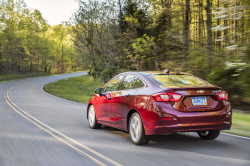
— A Chevy Cruze class action lawsuit has been dismissed after the judge could find no evidence of cheating on emissions tests, and an appeals court ruled federal regulators call the shots over emissions regulations.
The judge notes the plaintiffs, General Motors and the Robert Bosch company have spent years in court regarding allegedly illegal diesel emissions involving 2014-2015 Chevrolet Cruze cars.
The entire ordeal began with Volkswagen's use of emissions defeat devices to fool federal regulators and consumers.
Attorneys across the country began filing massive class action lawsuits against several automakers alleging real-world emissions were higher than estimates from the Environmental Protection Agency.
The Chevy Cruze emissions lawsuit alleges owners overpaid for their 2014-2015 vehicles because they were duped into buying "clean diesel" vehicles that weren't so clean.
While the judge had already found no evidence of defeat devices in the Cruze cars, a recent ruling from the Sixth Circuit Court of Appeals put an end to the Cruze case.
The Chevy Cruze Emissions Lawsuit
The GM class action alleges real-world testing proves the clean diesel Chevy Cruze emits far more pollution on the roads than in lab testing. The plaintiffs assert the Cruze cars emit dangerous and illegal levels of nitrogen oxides above maximum EPA standards.
The Cruze class action was filed in 2016, but in 2021 things weren't looking good for the plaintiffs when the judge saw no evidence of defeat devices even after more than 400 discovery filings.
In August 2022, the plaintiffs filed a motion to certify the case as a class action.
But according to the judge, in April 2023, "the Sixth Circuit dismissed seemingly identical claims as impliedly preempted by the Energy Policy and Conservation Act (EPCA), and its corresponding regulations for emissions testing, In re Ford Motor Co. F-150 & Ranger Truck Fuel Econ. Mktg. & Sales Pracs. Litig."
General Motors told the judge, "implied preemption warrants dismissal of Plaintiffs’ state-law claims," and “state laws that ‘interfere with, or are contrary to the laws of congress, made in pursuance of the constitution’ are invalid.”
Judge Thomas L. Ludington references the Ford ruling from the Sixth Circuit which dismissed the Ford emissions class action lawsuit.
Judge Ludington explained how the Sixth Circuit found the federal government handles emissions-related issues, not lawyers, experts or juries.
- “First, because the EPA accepted Ford’s testing information and published its estimate based on that information, plaintiffs’ claims essentially challenge the EPA’s figures.”
- “Second, allowing juries to second-guess the EPA’s fuel economy figures would permit them to rebalance the EPA’s objectives.”
- “Third, as the EPA has the authority to approve or reject fuel economy figures, its ‘federal statutory scheme amply empowers the [agency] to punish and deter fraud.’”
- “Finally, state-law claims would skew the disclosures that manufacturers need to make to the EPA.”
According to Judge Ludington:
"Allowing plaintiffs and juries to override these judgments could give rise to a shadow regulatory system—one led by lawyers and experts, rather than by Congress and the EPA. Plaintiffs’ claims would overstep the EPA’s powers to penalize and to prevent fraud. In sum, the state-law claims that Plaintiffs have advanced here are preempted by the Clean Air Act."
After eight years of arguments, Judge Ludington dismissed the GM emissions lawsuit with prejudice.
The Chevrolet Cruze class action lawsuit was filed in the U.S. District Court Eastern District Of Michigan: Counts, et al., v. General Motors LLC.
The plaintiffs are represented by Carella, Byrne, Cecchi, Olstein, Brody & Agnello, PC, Hagens Berman Sobol Shapiro LLP, and Seeger Weiss LLP.




